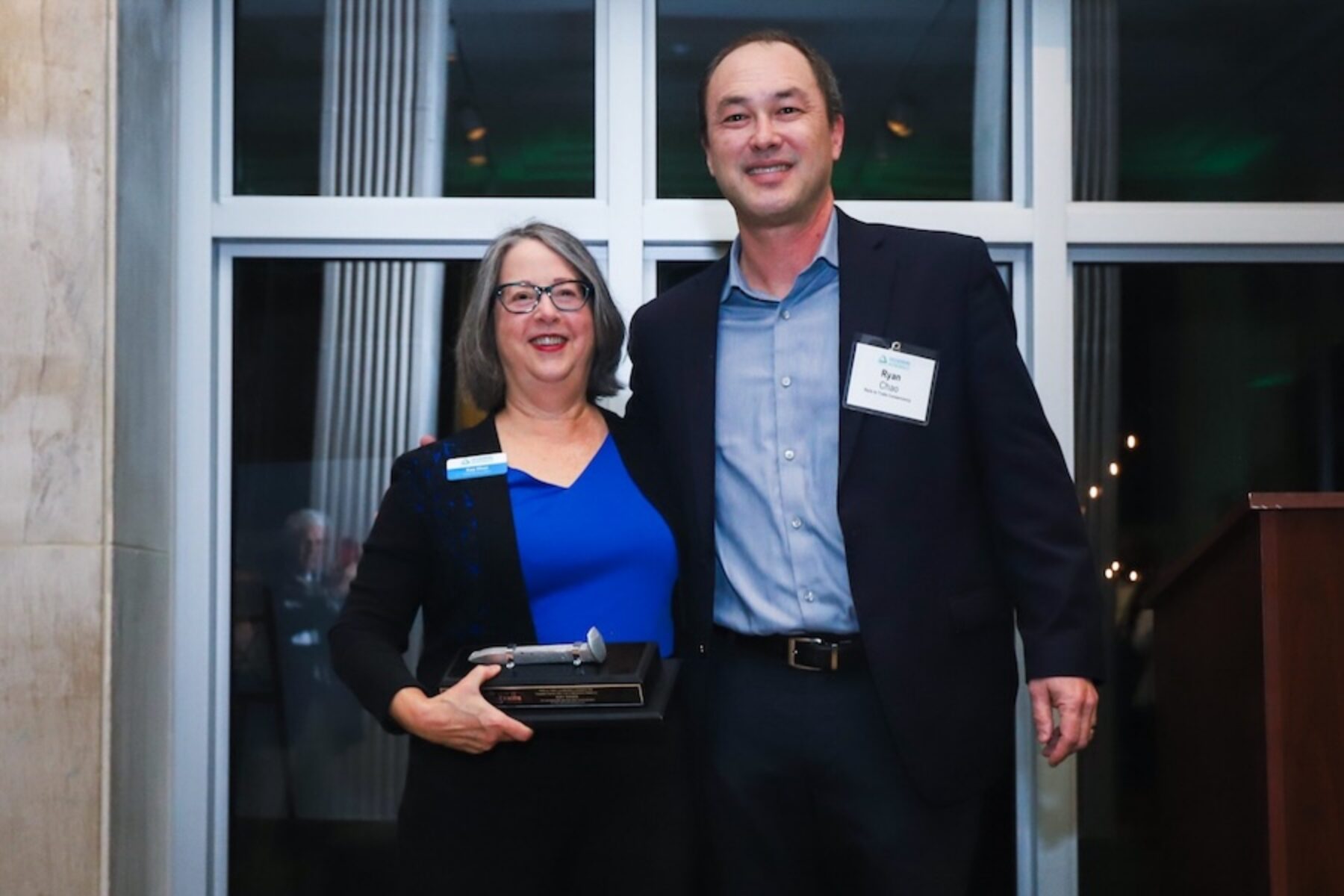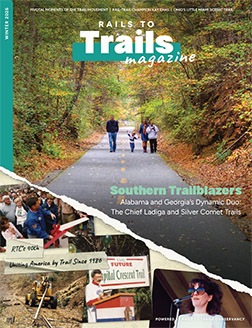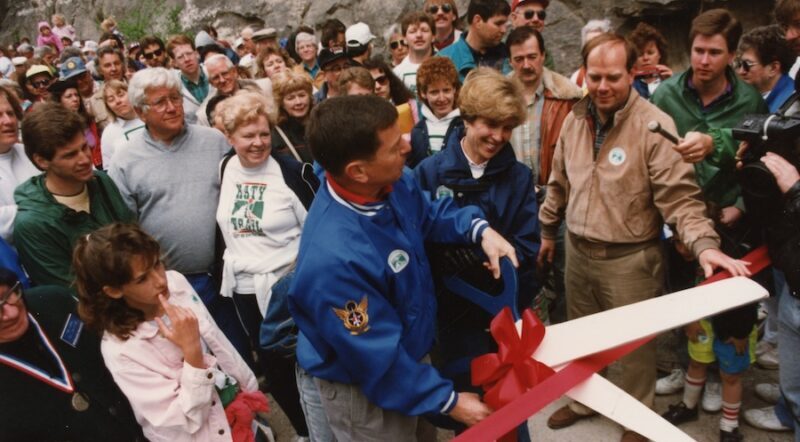A Conversation With 2025 Rail-Trail Champion Kay Ehas

The Emerald Trail in Jacksonville, Florida, is a developing project that will offer residents and visitors 30 miles of connected walking and bicycling infrastructure. When complete, the trail will link 14 of the city’s neighborhoods—including ones historically underserved for decades—to the city’s downtown area as well as a range of trails, parks, schools, businesses and other destinations across the region. In December of 2025, Rails to Trails Conservancy honored Kay Ehas, CEO of Groundwork Jacksonville, as the Doppelt Family Rail-Trail Champion of the year for her leadership on the groundbreaking project in partnership with the city, highlighting her effective community-driven approach anchored in public-private partnerships to develop and build momentum for the Emerald Trail.

“The vision of the Emerald Trail is about more than being a trail. We see the trail as a catalyst [for] neighborhood revitalization.”
—Kay Ehas

The first 1.3-mile segment, the LaVilla Link—which opened in May 2024—is now an early model for the overall vision, serving as a city signature and tourist destination, as well as a catalyst for physical activity, improved health outcomes and revitalization in an area where 70% of residents are low income and at high risk for chronic illness.

This article was originally published in the Winter 2026 issue of Rails to Trails magazine and has been reposted here in an edited format. Subscribe to read more articles about remarkable trails while also supporting our work.
Rails to Trails’ Brandi Horton sat down with Ehas recently to talk about her work and vision for Jacksonville. Below are highlights of their conversation.

Can you share a bit about the vision for the Emerald Trail?
The vision of the Emerald Trail is about more than being a trail. We talk about community-building work, because we see the trail as a catalyst [for] neighborhood revitalization.
Neighborhoods have been neglected for decades. Promises were made that weren’t kept. The trail is probably the first major infrastructure investment since highways cut through neighborhoods. We see it as a major connector, both in offering mobility options to folks that don’t have a car, and also [in offering] social connections—connecting these neighborhoods to each other. They have a lot more in common than not.
Also [we are] really greening up the urban area as we go through it, adding lots of trees and native plants. The city gets healthier by using the trail. Economic development happens because of the trail, and we know that will come because it has in other areas. And it’s happening already. Even before we built the first mile, commercial developers were acquiring abandoned commercial buildings to rehab them and reuse them, which was really exciting.
We see [the Emerald Trail] as this incredible way to make our urban core neighborhoods and our downtown really attractive for both visitors [and for] people who want to move back to the urban core and for tourism.
How did you go about engaging the community in that conversation?
When we pulled together a steering committee to develop the trail master plan, we had residents from the neighborhoods on that steering committee so that from the get-go, they were involved in the planning process [along with] city folks and other agencies and businesses. The LaVilla Link, the first mile that we built, actually came about because of residents on the steering committee. When we shared the first draft of the plan, they were like, “Wait a minute, I want to be able to get more directly downtown.” Now, we can’t imagine not having that LaVilla segment, because it is in a major, major historic neighborhood in the city of Jacksonville, referred to as the Harlem of the South.

That engagement is a big piece of what stands out about this project and your leadership. So does the public-private partnership between your organization, the groups who’ve joined you at the table and the City of Jacksonville. Why do you think that’s important in Jacksonville to bring all those groups together, and why do you think it’s working?
We can’t get the project done without public money. The bottom line is: It’s a very expensive undertaking, and you need public dollars to get it done.
When we did the trail master plan, we got an agreement with the city that we would each pay for half of trail design, and they would pay for construction. We thought from the very beginning that this needed to be a community project, not a city project, because the community is what tells elected officials and others, “This is a priority for us.” That helps get them on board for that. That has always been how we’ve gone about it, and I think that both the community and public officials know that we are honest brokers, we’re transparent, we are reliable, and we’re going to do what we say we’re going to do. It’s worked, and we have really good relationships. Relationships are key.
Not very long ago, RTC celebrated with you and your staff after you landed a massive $147 million grant from the U.S. Department of Transportation. We were all dismayed when that grant was clawed back. What is noteworthy is that almost immediately your members of Congress stood up with you. Your local officials stood up with you and said this region is committed to the future of this project. Why do you think there’s so much support?
I think people understand the significance of a 30-mile trail and linear park system through the heart of the city as having tremendous value. They all get that. My outlook was, we didn’t start with $147 million, and we were making progress. So, we just have to continue to make progress, and we’ll figure it out as we go. That’s what leadership’s about.
Since then, we’ve had a groundbreaking. We’re about to do a groundbreaking for a one-mile creek project. We are continuing to move forward.
What advice do you have for the movement, for all the people trying to build the relationships, trying to secure the funding, trying to create those meaningful community engagements that can help to catalyze their trail projects?
My advice is to [have] a really big tent. The more folks you have on board, the easier it is to get things done. I do think that you should have private money in the game, and I think it’s critical, critical to involve the community.

The Doppelt Family Rail-Trail Champions Award has honored 44 individuals around the nation who have made significant contributions to the rail-trail movement through their hard work, volunteerism or support.

Donate
Everyone deserves access to safe ways to walk, bike, and be active outdoors.


